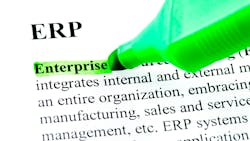Smart factories: A roadmap to optimization, not overhaul
Manufacturers seeking smart factories can avoid expensive rip-and-replace ERP systems by partnering with IT professionals to extend the life of their current systems.
The tide is turning in manufacturing. Competition is fierce, and the pressure to embrace Industry 4.0 methods is undeniable. Industry leaders have set their sights on so-called "smart factories"— interconnected facilities brimming with automation and data-driven insights.
See also: How to pick the right ERP—Negotiating the purchase and the end game
A recent Deloitte study underscores this shift: a seismic 86% of surveyed executives believe smart factories are the key to staying ahead in the next five years. These digitized production powerhouses promise a future of maximized productivity and groundbreaking innovation, with their success being determined by the critical data found in Enterprise Resource Planning (ERP) systems. However, a critical roadblock stands in their way: ERP reimplementations.
Traditional ERP reimplementations often entail lengthy timelines and the disruption of abandoning years of customizations—deterring many manufacturers. This challenge begs the question: Is there a faster, more efficient way to achieve successful digital transformation and reap the benefits of modern ERP systems?
Modern problems among legacy systems
The migration path to cloud-based ERP systems offer a promising trail to innovation for manufacturers. While these solutions provide enticing benefits, the reality for manufacturers can be less appealing. Experienced manufacturers, wary of the disruption and expense of replacing heavily customized legacy systems, carefully evaluate the "rip-and-replace" approach due to potential risks like skyrocketing costs, lengthy implementations, and operational chaos.
For example, integrating a modern cloud system with little flexibility for customizations fails to account for the unique needs and market dynamics faced by industrial enterprises. Through the elimination of vendor-imposed migrations and costly cloud implementations, manufacturing IT leaders can cater their technology investments to their specific needs and pave the way for a successful intelligent manufacturing future.
Strategic shift to successful implementation
To maintain efficiency and business agility during new technology integrations, organizations must embrace a modern approach to their ERP strategies. This strategy emphasizes partnering with experienced enterprise software support and services professionals to achieve greater flexibility, control and cost-effectiveness.
By doing so, companies can continue to extract value from their existing ERP investments while freeing up resources to invest in cutting-edge technologies like artificial intelligence (AI) and the internet of things (IoT)—key drivers of success in the smart factory landscape.
See also: Leveraging ERP and related technologies for a diverse customer experience
As an example of this approach, we can turn to Nexen Corp., a global manufacturer with a commitment to sustainability. Nexen had its sights set on the future—a future powered by Industry 4.0 technologies like AI, big data, and the cloud. However, the company was hesitant to make changes to its on-premesis IT environment, which is essential to business operations, as it provides granular access to data, applications and infrastructure.
Additionally, Nexen’s current SAP system presented a hurdle. Nexen wasn't getting the support they required for their S/4HANA Cloud deployment. Slow response times and limited assistance with their extensive customizations left them frustrated, despite paying hefty support fees.
By partnering with external IT professionals, Nexen cited significant benefits, including extended support for SAP Business Suite by up to 15 years. The enterprise also receives ongoing support for customizations, reduced annual maintenance fees by up to 50% and 24/7 access to highly skilled support, including engineers with over 10 years of experience.
In its mission-critical environments, Nexen IT issue resolution times have dramatically decreased, a crucial element for secure, smoothly operating critical infrastructure ecosystems.
Manufacturing the future of smart factories
The manufacturing landscape is undergoing a substantial shift. Smart factories, powered by automation and data-driven insights, are no longer a futuristic vision but a must-have for competitive advantage.
See also: A guide to inserting AI into your workflow
Instead of succumbing to vendor pressure for expensive "rip-and-replace" solutions, manufacturing IT leaders are charting a new course. This course emphasizes partnering with professional IT support and services providers to unlock the full potential of existing ERP systems.
Nexen was empowered by this approach—increasing its flexibility and control over its mission-critical infrastructure. Now, the company can bridge the gap between its existing ERP investment and its Industry 4.0 vision—maximizing ROI on current solutions and accelerating technological innovation in other key business areas.
In today's dynamic and competitive manufacturing landscape, with major providers offering one-size-fits-all solutions, manufacturers, like Nexen, benefit from prioritizing customizable solutions and comprehensive support that align with their unique business strategies.
About the Author

Emmanuelle Hose
Emmanuelle Hose has more than 25 years of experience in the IT industry, leading enterprise software sales, service, and development operations across Europe, North America, and Oceania. After serving in several executive roles with global software companies, she recently led Rimini Street business operations across Australia and New Zealand.
